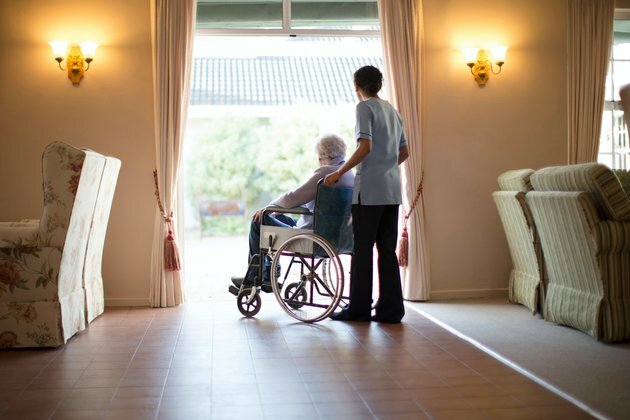Why care home staff in the UK are at breaking point
The Conversation
20 Jun 2022, 20:08 GMT+10

Since the post-COVID reopening of the economy, staffing shortages in the care sector in England have been of increasing concern. In October 2021, British charity Skills for Care warned that, at 8.2%, adult social care vacancy rates in England were exceeding pre-pandemic levels (which in 2019, stood at 8%). That figure has since exceeded 10%, according to Skills for Care's monthly tracking.
The UK government has sought to remedy to this crisis, in part, with the new health and social care levy, which came to force in April 2022. This levy is currently being implemented as an increase in National Insurance contributions.
Experts have pointed out that this is having a disproportionate impact on household budgets for those on lower incomes and those below the age of 50. They have also warned that it won't fix the problem.
This is because a relatively small portion - Pound 5.4 billion of the Pound 39 billion to be raised in the next three years - is set to go to social care, with the remainder to be spent on the NHS. And half of that Pound 5.4 billion will be used to compensate for the cap on care costs of self-funders. Crucially, only Pound 500 million has been allocated to workforce reform, and this amount is to be spent, not on the pay uplift so desperately needed for recruitment and retention, but on training and qualifications.
Our ongoing research (the results of which are not yet published) looks at the financial impact COVID has had on care homes for older people and their staff. We interviewed managers, care-giving staff and support staff from for-profit and non-for-profit providers of all sizes. We have found that most people don't think carers need more training - they are, as many reminded us, among the best trained workforce in the economy. What they do need is improved working conditions and better pay.
Conversely, the shortage of qualified nurses is one of the biggest pressures on both nursing homes and on the NHS. Therefore, rather than offering more training to existing carers, we have to pay them more. And the levy money should be used to train new nurses.
Pandemic effects on workforce
From senior managers to carers, people employed in the care sector repeatedly emphasised that better pay and working conditions were crucial to filling the care workforce shortages. Measures already taken towards further professionalisation - such as the carers' registry established in Scotland in 2001 - have been shown to have done nothing to improve pay and conditions for carers and, by extension, staffing.
Although social care benefited in 2020 from COVID closures in sectors recruiting from the same labour pool, it has been struggling in the past year to compete for talent. Retail and tourism in particular offer higher wages and better working conditions. And people working in these sectors tend to enjoy comparatively higher social esteem for roles that are less mentally and physically demanding.
The media has periodically pointed out the immense strain that the pandemic placed on the care workforce. But the sheer extent of the pressure our carers have endured is staggering.
Care home staff continue to experience crushing workloads. Many have worked 14-16 hours a day, for weeks on end without a break, and many months without a holiday.
They have also endured devastating COVID outbreaks at various stages of the pandemic. While these have claimed mostly frail residents' lives, [workers too](https://www.theguardian.com/society/2022/may/05/care-homes-in-england-demand-revival-of-covid-fund-to-pay-isolating-staff) have been affected. They have lived and worked with the constant fear of catching and bringing COVID into care homes as a result.
The consequent prevention measures, mandated by government, employers or being self-imposed, have led to social isolation. Early on in the pandemic, it was not uncommon for care home staff, including managers, to move into their workplaces or avoid social contact, in order to minimise the risk to their residents and families.
The government's rules changed over time but as our ongoing study and media reports show, care staff have felt keenly that they are living by different rules to the rest of the society. When the end of lockdown, on July 19, 2021, was dubbed "Freedom Day", carers and the vulnerable people they care for rightly resented that description.
On an individual level, these workloads, working conditions and emotional pressures have led to to high burnout rates and mental health concerns. Sector-wide, this has resulted in ever higher staff turnover rates and staff shortages.
Managerial thinking usually equates reduced staffing with efficiency and cost-savings. But we are finding that staff shortages in care homes are actually costing the sector dearly. Providers are struggling to keep services running. Staffing agencies' fees have reportedly skyrocketed, and due to sponsorship costs and visa fees, overseas recruitment is similarly costly. And there are the usual recruitment costs which accumulate with higher staff turnover.
Care home providers' spending are increasing elsewhere too, as overheads become more expensive with inflation. Those who have significant amounts of state-funded residents are unable to pass on the additional costs and are thus feeling the squeeze. Large private chains have already announced they will increase fees up to 10% this year citing staff shortages as a prominent reason in addition to soaring food and energy prices.
The social care reform which the government has begun to implement comes nowhere near resolving this crisis. It is clear that spending more on staff will benefit everyone - service users, service providers, workers, and, ultimately, the taxpayer.
Authors: Derya Ozdemir Kaya - Research fellow in Organisation and Work, Warwick Business School, University of Warwick | Marianna Fotaki - Professor of Business Ethics, Warwick Business School, University of Warwick 
 Share
Share
 Tweet
Tweet
 Share
Share
 Flip
Flip
 Email
Email
Watch latest videos
Subscribe and Follow
Get a daily dose of Birmingham News news through our daily email, its complimentary and keeps you fully up to date with world and business news as well.
News RELEASES
Publish news of your business, community or sports group, personnel appointments, major event and more by submitting a news release to Birmingham News.
More InformationBusiness
SectionBP appoints ex-Shell finance chief Simon Henry to board
LONDON, U.K.: This week, BP appointed Simon Henry, former Shell finance chief, to its board as a non-executive director effective September...
FedEx, UPS step up as Canada Post loses market share in strikes
OTTAWA, Canada: With Canada Post struggling to maintain operations amid labour unrest, rivals like FedEx and UPS are stepping in to...
U.S. stocks steady Tuesday despite tariffs turmoil
NEW YORK, New York - U.S. and global markets showed a mixed performance in Tuesday's trading session, with some indices edging higher...
Beijing blamed for covert disinformation on French fighter jet Rafale
PARIS, France: French military and intelligence officials have accused China of orchestrating a covert campaign to damage the reputation...
Birkenstock steps up legal battle over fakes in India
NEW DELHI, India: Birkenstock is stepping up its efforts to protect its iconic sandals in India, as local legal representatives conducted...
Beijing hits back at EU with medical device import curbs
HONG KONG: China has fired back at the European Union in an escalating trade dispute by imposing new restrictions on medical device...
United Kingdom
SectionUS sends message by publicizing visa ban on UK punk-rap band
WASHINGTON, D.C.: The Trump administration has made public a visa decision that would usually be kept private. It did this to send...
British PM faces major party revolt over welfare reforms
LONDON, U.K.: British Prime Minister Keir Starmer won a vote in Parliament this week to move ahead with changes to the country's welfare...
Explainer: Where do things stand now as Trump prolongs tariff pause?
The delay adds yet another twist to Trump's original 90 deals in 90 days promise -- so far yielding only two vague trade agreements...
'Bridgerton' star Simone Ashley joins 'The Devil Wears Prada 2'
Los Angeles [US], July 9 (ANI): 'Bridgerton' actress Simone Ashley has joined the cast of 'The Devil Wears Prada 2,' according to Deadline....
Oil Price Cap, Slovak Veto Stand In Way Of New EU Russia Sanctions
The European Union is edging closer to finally adopting its latest sanctions package, the 18th since the full-scale Russian invasion...
Harris English's caddie denied U.K. visa due to past drug arrest
(Photo credit: Bill Streicher-Imagn Images) Harris English may have to face the next two critical tournaments in the United Kingdom...













